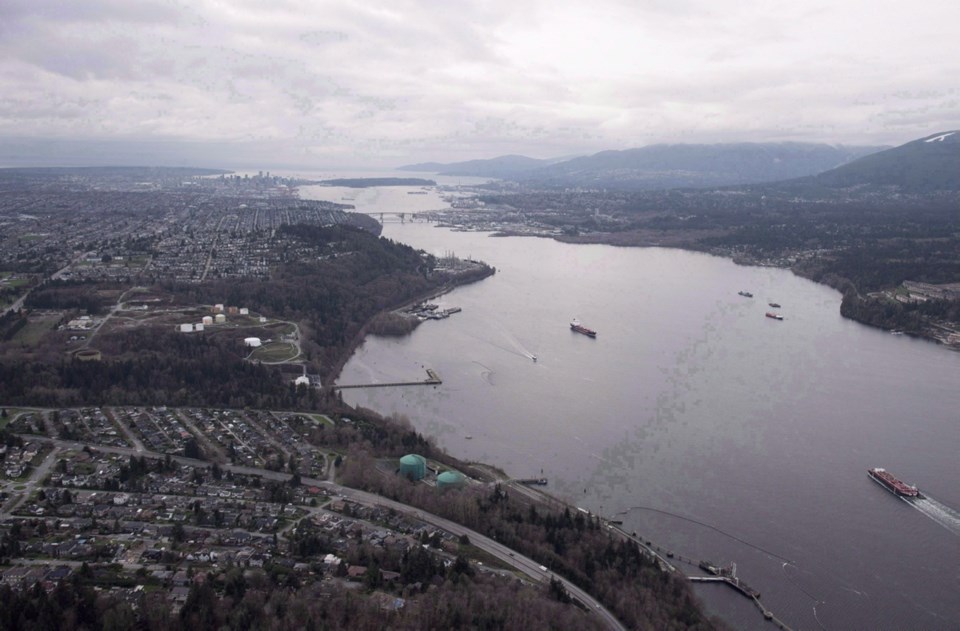 The B.C. government signed on the dotted line this week and committed to endorsing and supporting Kinder Morgan’s polarizing oil-pipeline proposal from Alberta to the Lower Mainland.
The B.C. government signed on the dotted line this week and committed to endorsing and supporting Kinder Morgan’s polarizing oil-pipeline proposal from Alberta to the Lower Mainland.
Premier Christy Clark now considers the five conditions she set for approval of oil pipelines have been met. The flurry of approvals late last year from the National Energy Board, the federal government and the Prime Minister’s Office brought Clark to the brink of giving the $5.5-billion project the nod. Now it’s official.
The argument over shipping bitumen to B.C.’s West Coast and beyond could be a big part of the spring election campaign.
B.C. Liberals will be backing the twinning of the current line and the increase in tanker traffic that ensues. The NDP and the Greens are opposed.
The B.C. environmental assessment office issued its formal approval of the project on Wednesday, subject to several more conditions added to the 157 imposed federally. Two cabinet ministers also gave it a formal blessing, stating all the potential adverse impacts can be avoided, minimized or accommodated.
Then, Clark confirmed her government’s whole-hearted support for the project, after almost five years of sitting on the sidelines and holding to the position that the five conditions to do with safety, First Nations participation and reimbursement for the risk incurred have to be met.
Two key moves were made in the past few weeks to address those issues, one by Prime Minister Justin Trudeau, the other by the company.
Trudeau announced a $1.5-billion Ocean Protection Plan that will beef up marine safety and spill-response capabilities on the coast. The pipeline project was already subject to more rigorous tug-escort requirements for all tankers leaving the Burnaby terminal. The new federal investment will be noticed in new assets up and down the coast.
The second move was announced Wednesday, an unprecedented commitment by Kinder Morgan to make an outright annual payment to B.C. every year, over and above any taxes and fees. The company will pay between $25 million and $50 million a year for 20 years, depending on the operation of the pipeline. The government said it’s the first time a major industrial project will share revenue directly with the province.
It represents the “fair share” B.C. has been insisting on. All the money will be dedicated to “clean communities” programs, to fund environmental projects.
Clark is ready to take the pipeline to voters as an example of a government that stuck to its principles and decided a major issue strictly on the benefits for B.C. She’ll also use it to highlight the confusion within the NDP over the issue.
After wavering throughout the long approval process, the NDP hardened its stance against the project late last year. Leader John Horgan on Wednesday held up a jam jar full of heavy oil someone gave him two years ago and said the chance of “paving the seabed” through a marine spill is too great.
“This is what risk looks like.”
If the NDP wins the May election, Horgan said his government would do everything it could to halt the project. He acknowledged a coast-Interior split in B.C. over the issue. South coast residents appear to be opposed to the project, but there is support in other regions for a project that represents jobs and wealth.
“Those in the Interior don’t have the same perspective as those of us on the coast,” said Horgan. He said it’s not a partisan issue, it’s a B.C. challenge.
Approval from the environmental assessment office wasn’t strictly necessary, as it’s a federal project. But that office OK’d the pipeline expansion with 37 more conditions related to wildlife, offsets in parks the line will run through and greenhouse-gas emissions, which have to be offset.
The office recognized just as the federal agency did that increasing tanker traffic from five to 34 a month “is likely to result in significant adverse effects to southern resident killer whales.”
But it noted the federal government is committed to a recovery plan, so it endorsed the project nonetheless.
All that’s left now is to wade through the tsunami of visceral objections on the south coast and build it.



